But now you are going to say:Stop! That's not what we agreed.
但现在你一定会说,"停!那不是我们当初同意的。
When did these people live, what were they like, and how did they live?
这些人生活在什么时候,他们长什么样,还有他们怎样生活?
Your questions make me blush, as I have to admit that we don't know, precisely.
你的问题问得我脸红,我不得不承认准确地说我们还不太清楚,
But we will find out one day, and maybe you will want to help.
但是我们有一天会弄清楚的。也许你想出把力。
We don't know because these people didn't yet know how to write things down, and memory only takes us a little way back.
我们不知道这一情况因为这些人不会作任何文字记载,而且记忆不能带我们追溯那么远。

But we are making new discoveries all the time.
但我们一直有新发现。
Scientists have found that certain materials, such as wood and plants and volcanic rocks, change slowly but regularly over a very long period of time.
科学家们已经发现某些物质,如木头和植物以及火山岩,长时间缓慢却有规则地变化。
This means that we can work out when they grew or were formed.
这意味着我们可以计算出它们是何时生长出来或形成的。
And since the discoveries in Germany, people have carried on searching and digging, and have made some startling finds.
自德国有发现开始,人们继续探寻和挖掘人类的遗骸,而且有了一些惊人的发现。
In Asia and Africa, in particular, more bones have been found, some at least as old as the Heidelberg jaw.
特别是在亚洲和非洲,人们发现了很多骨骼,有一些至少与在海德堡挖掘的下颌骨的年代一样久远。












